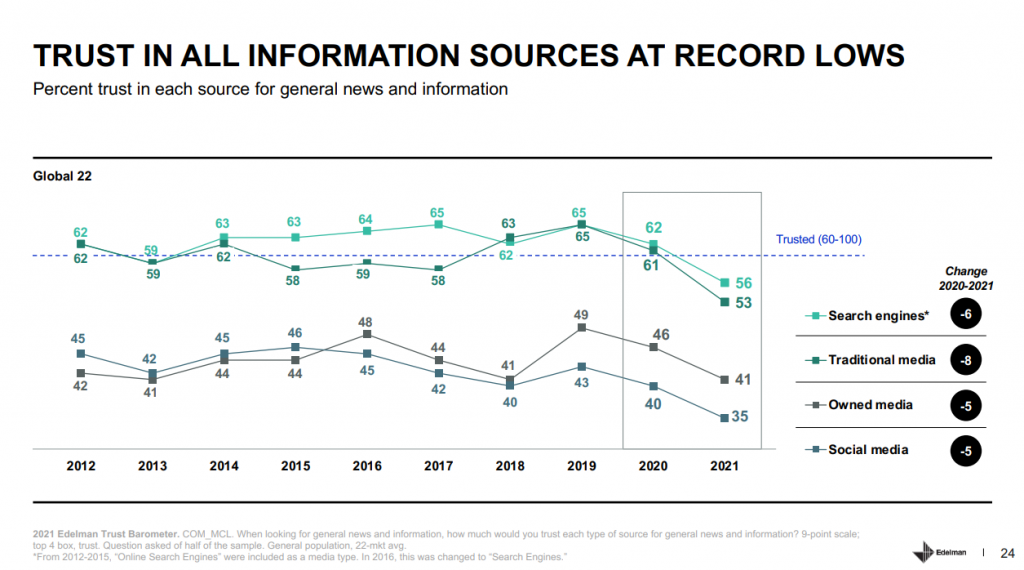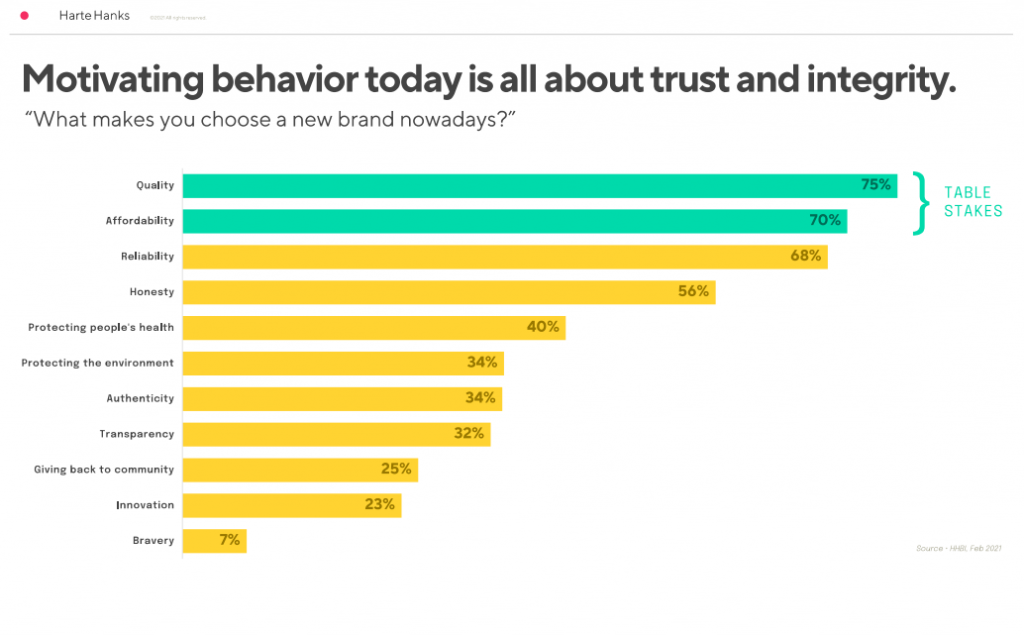If you’re touching any facet of communications, you’re in for a climb as “trust in all information sources [is] at record lows”.
Just like the ‘us’ in trust is important – the ‘and’ in brand is equally as important. Trusted brands close the value-destroying divide between ‘brand’ and ‘performance’ marketing which fosters loyalty, engagement, brand exclusivity, and lastly relationships.
When you Google ‘trust’ you get 6,490,000,000 results. That’s 13% more than COVID-19 (5,650,000,000), 90% more than Cola-Cola (653,000,000), and 93% more than Joe Biden (456,000,000). (Source: Google search; June 20, 2021)
Edman’s Trust Barometer shows “trust in all information sources [is] at record lows”.
Source: Edelman Trust Barometer 2021, p24; https://www.edelman.com/sites/g/files/aatuss191/files/2021-01/2021-edelman-trust-barometer.pdf
For Our Business Right Now
Most interestingly for the communications business, is how trust serves as a bridge for accomplishing both short-term and long-term goals.
Tom Roach’s blog post “The Wrong and Short of It” is my favorite for setting this up more. He writes, “Short-termism and long-termism are both just wrong-termism. So let’s end the false choice between long and short-term marketing tactics, maximise the compound effects of getting them working together in harmony, and start to close the value-destroying divide between ‘brand’ and ‘performance’ marketing. It’s limiting marketing effectiveness and brand growth, when we’ve never needed them more.”
No more short-term, long-term… trust is uniquely an “all-term” mechanism. And, we desperately need “all-term” thinking right now.
What “All-Term” Thinking Involves
More specifically, what does “all-term” thinking involve? It’s more than quality and affordability. Like any lasting relationship, it boils down to being reliable, honest, authentic, transparent, and care-full.
Source: March 2021 HarteHanks Behavioral Index, p49
Essentially and in the simplest terms, it’s how a brand behaves. Ah, yes – finally to behavior (my favorite)!
The Us in Trust is Rooted in How a Brand Behaves
Psyche.co published a nice bit in 2020 on ‘How to Know Who’s Trustworthy’ which maps out five virtues of “intellectual dependability” to lean on when “knotty problems call for sound advice…”
- Intellectual benevolence – genuinely caring about your wellbeing
- Intellectual transparency – sharing perspective with the motivation of helping you progress
- Communicative clarity – removing or resolving sources of ambiguity when communicating
- Audience sensitivity – an appreciation of an audience’s distinctive features
- Intellectual guidance – displaying a certain open-ended wisdom in supporting you with inquires
(Source: Pysche.co, Psycho Guides, November 2020; https://psyche.co/guides/how-to-spot-whos-trustworthy-and-whos-not-on-what-matters?utm_source=Psyche+Magazine&utm_campaign=9ab72309f6)
If we’re pulling apart the ‘us’ in trust, then we need to also look at the ‘and’ in brand. That is, trusted brands enjoy more loyalty AND more engagement AND acceleration along the marketing funnel AND exclusivity in the category AND lasting consumer relationships. WARC published a nice piece last February on this for subscribers here. (https://www.warc.com/content/article/bestprac/what-we-know-about-brand-trust/110020, February 2021)
So, to pull it all together – trust levels suck right now. In order to improve as communicators, we need to move from short-term/long-term to “all-term” thinking. Just like the ‘us’ in trust is important – the ‘and’ in brand is equally as important. Trusted brands close the value-destroying divide between ‘brand’ and ‘performance’ marketing which fosters loyalty, engagement, brand exclusivity, and lasting relationships.


